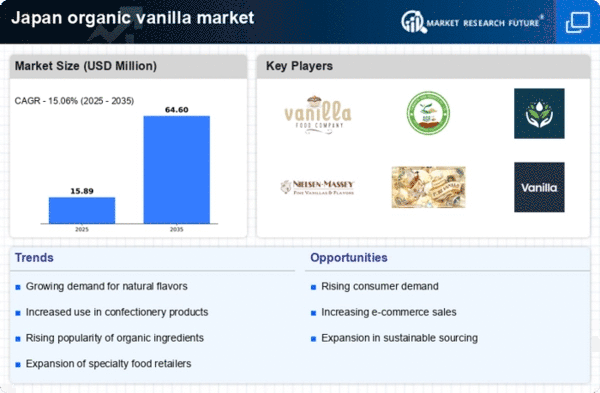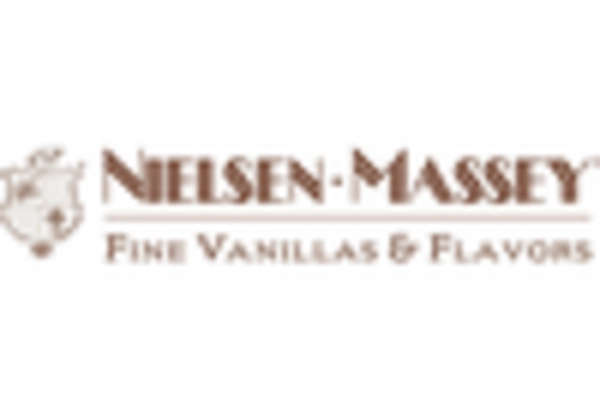Innovations in Food Technology
The organic vanilla market in Japan is experiencing a transformation due to innovations in food technology. Advances in extraction and processing techniques allow for the production of higher-quality organic vanilla with enhanced flavor profiles. These technological improvements not only increase efficiency but also reduce production costs, making organic vanilla more accessible to a wider audience. Market data indicates that the food technology sector is projected to grow by 12% annually, suggesting a robust investment in research and development. The organic vanilla market stands to benefit from these innovations, as they enable producers to offer unique products that cater to evolving consumer tastes and preferences. This dynamic environment fosters competition and encourages continuous improvement within the market.
Growth of Premium Food Products
The organic vanilla market in Japan is significantly influenced by the growth of premium food products. As consumers become more discerning about their food choices, there is a marked shift towards high-quality, gourmet ingredients. This trend is evident in the food service sector, where restaurants and cafes increasingly incorporate organic vanilla into their menus to enhance flavor profiles and appeal to upscale clientele. Market data suggests that the premium food segment has seen a growth rate of around 15% in recent years, indicating a robust appetite for luxury culinary experiences. The organic vanilla market stands to gain from this trend, as consumers are willing to pay a premium for products that offer superior taste and quality, thereby driving sales and expanding market reach.
Rising Popularity of Plant-Based Diets
The organic vanilla market in Japan is positively impacted by the rising popularity of plant-based diets. As more consumers adopt vegetarian and vegan lifestyles, the demand for plant-derived ingredients, including organic vanilla, is on the rise. This shift is not merely a trend but appears to be a fundamental change in dietary preferences, with market data indicating that the plant-based food market in Japan has grown by approximately 20% over the last few years. The organic vanilla market is well-positioned to capitalize on this movement, as organic vanilla serves as a versatile flavoring agent in various plant-based products, from desserts to beverages. This alignment with health and sustainability trends enhances the appeal of organic vanilla among a broader consumer base.
Increasing Demand for Natural Ingredients
The organic vanilla market in Japan experiences a notable surge in demand for natural ingredients, driven by a growing consumer preference for clean-label products. As health-conscious consumers increasingly scrutinize ingredient lists, the appeal of organic vanilla, known for its purity and absence of synthetic additives, becomes more pronounced. This trend is reflected in market data, indicating that the organic food sector in Japan has expanded by approximately 10% annually over the past few years. The organic vanilla market benefits from this shift, as manufacturers adapt their offerings to meet the rising expectations for transparency and quality. Furthermore, the increasing awareness of the environmental impact of synthetic ingredients further propels the demand for organic vanilla, positioning it as a favored choice among consumers seeking sustainable options.
Expansion of Organic Certification Standards
The organic vanilla market in Japan is influenced by the expansion of organic certification standards, which enhances consumer trust and product credibility. As regulatory bodies implement stricter guidelines for organic labeling, consumers gain greater confidence in the authenticity of organic products. This development is crucial for the organic vanilla market, as it ensures that products meet high-quality standards, thereby attracting discerning consumers. The increased transparency associated with certified organic products is likely to drive sales, as consumers are more inclined to purchase items that are verifiably organic. Furthermore, the emphasis on certification may lead to a more competitive market landscape, encouraging producers to innovate and improve their offerings to meet consumer expectations.
















